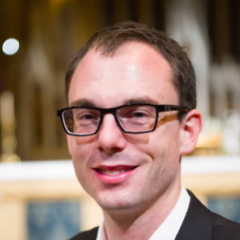Friday's concert from the Sydney Symphony, "Fireworks and Fantasy", most certainly lived up to its title. It was a concert which showed considerable talent in all three pieces, from the world première of a piece by local composer Elliott Gyger, to the extraordinary display of visiting pianist Behzod Abduraimov, and the considerable ability of the orchestra's own principal viola player, Roger Benedict, who was the soloist in Berlioz's Harold in Italy.
The nature of the opening piece in the evening's concert was unknown until two months ago. In its eightieth anniversary season, the Sydney Symphony had launched a competition for someone to write a new piece celebrating this important milestone. The winner was Elliott Gyger, who composed On air. The piece takes as its inspiration the earliest origins of the Sydney Symphony eighty years ago, when the ensemble consisted of just seventeen players, drawn together by the Australian Broadcasting Commission as a studio orchestra. On air features this same combination of seventeen players, who perform in the work both as soloists in their own right and also in dialogue with the rest of the orchestra. This highly complex piece was very fractured in character, featuring jagged rhythms thrown around different parts of the orchestra. The SSO certainly did this new work justice, performing it with great rhythmic precision.
The next piece, Prokofiev's Piano Concerto no. 3, was without doubt for me the highlight of the concert – indeed, one of the highlights of my concert-going year so far. I have mentioned before the high quality of visiting soloists the SSO seems to attract. Friday evening's soloist was simply astonishing, and one of the best concerto performances I have ever heard. Born only in 1990, the Uzbekistan-born pianist Behzod Abduraimov is already being hailed as the new Horowitz. It must be extremely daunting for any pianist to perform under the great Vladimir Ashkenazy, but Abduraimov took it all in his stride. It was in every way a complete performance.
The more tender moments of the concerto were beautifully executed with Abduraimov drawing out a beautifully lyrical tone from the piano. He understood the almost sardonic humour of the piece too, with little nuances of rubato highlighting the more subtle aspects of the score. The demonically hard virtuosic passages were flawlessly delivered, with great passion and energy. I had the chance to speak to Abduraimov during the interval, when I went to get my CD signed. He had not even broken a sweat. He played the piano with such poise and natural ability that even the hardest passages were made to look easy.
The second half of the concert was devoted to Berlioz's Harold in Italy for solo viola and orchestra. The solo part was originally written for Paganini, who wanted to showcase his new Stradivarius viola. However, after seeing all the rests in the score, Paganini refused to play it, reportedly saying, "This won't do!... I must be playing the whole time!" Friday evening's soloist, Roger Benedict, had no such hang-ups. He is the principal of the Sydney Symphony and a vastly experienced viola player, having been both principal viola of the Philharmonia Orchestra for eleven years, and guest principal with the Chamber Orchestra of Europe.
Harold in Italy is a symphony with a viola soloist, where the violist plays the part of a hero, its own motto theme being introduced at the beginning of the work. The symphony tells the story of the viola-hero, who wanders through mountains, encounters pilgrims, and witnesses a lover's serenade and a frenetic orgy of brigands. Benedict, clearly enjoying being a soloist with his own orchestra, revelled in the differing characters of his solo part, always producing a wonderfully rich and warm tone. The orchestra under Ashkenazy's direction played with sensitivity and drama, bringing a great evening to a fitting conclusion.


